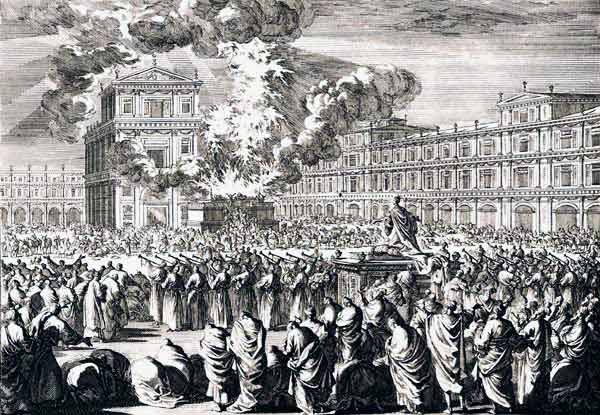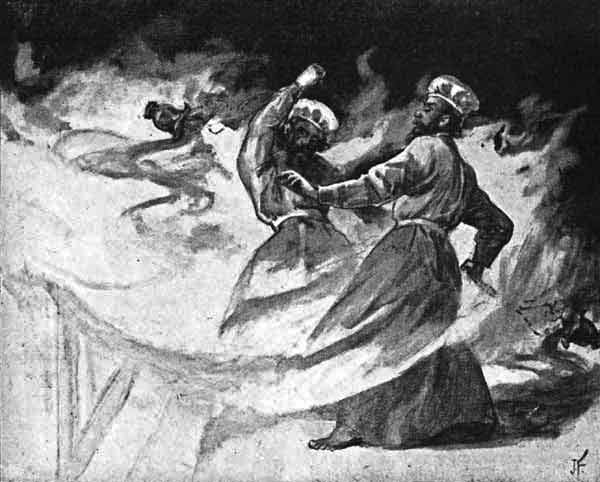
Dedication of Solomon's Temple.
David Martin, 1639-1721.
Otto Elliger engraving shows the dedication of the Temple with large numbers of animals sacrificed on the altar, trumpets blown, and a cloud filling the house of the Lord.
After Solomon became the king, scripture records many of his activities that heretofore had been solely performed by the priests, that is to say the Levites. The cases where Solomon acted as a priest are extremely important and need to be examined in detail. There are actually so many of these that we will only examine some of the most conspicuous and major incidents. Others may wish to independently examine some more of Solomon's many priestly activities that are not examined here.
It is extremely important to realize that the duties in the temple were exclusively reserved for the priests, the Levites. Not only were these functions appropriated exclusively to the Levites, but also, the Levites had to perform these duties in strict accordance with the proper procedures. Certain families were charged with specific priestly functions and there were to be no modifications to that organizational structure. NO other parties except the priests in any event were authorized to perform the priestly function. This had been the case since the Lord appeared at Horeb and there are realistically no examples where transgressing this directive did not result in dramatic calamity. In fact, it resulted in drastic consequences in the case of Solomon, but most have overlooked this point heretofore.
Numbers 8:13 And thou shalt set the Levites before Aaron, and before his sons, and offer them for a wave-offering unto the Lord. 14 Thus shalt thou separate the Levites from among the children of Israel; and the Levites shall be Mine. 15 And after that shall the Levites go in to do the service of the tent of meeting; and thou shalt cleanse them, and offer them for a wave-offering. 16 For they are wholly given unto Me from among the children of Israel; instead of all that openeth the womb, even the first-born of all the children of Israel, have I taken them unto Me. 17 For all the first-born among the children of Israel are Mine, both man and beast; on the day that I smote all the first-born in the land of Egypt I sanctified them for Myself. 18 And I have taken the Levites instead of all the first-born among the children of Israel. 19 And I have given the Levites--they are given to Aaron and to his sons from among the children of Israel, to do the service of the children of Israel in the tent of meeting, and to make atonement for the children of Israel, that there be no plague among the children of Israel, through the children of Israel coming nigh unto the sanctuary.' (JPS)
Numbers 3:5 And the Lord spoke unto Moses, saying: 6 'Bring the tribe of Levi near, and set them before Aaron the priest, that they may minister unto him. 7 And they shall keep his charge, and the charge of the whole congregation before the tent of meeting, to do the service of the tabernacle. 8 And they shall keep all the furniture of the tent of meeting, and the charge of the children of Israel, to do the service of the tabernacle. 9 And thou shalt give the Levites unto Aaron and to his sons; they are wholly given unto him from the children of Israel. 10 And thou shalt appoint Aaron and his sons, that they may keep their priesthood; and the common man that draweth nigh shall be put to death.' (JPS) (Emphasis added)
Some examples of calamities that resulted from transgressing this principle include those of Nadab and Abihu, Korah and his band, Hophni and Phineas, Uzzah, King Saul and King Uzziah, to name a few instances apart from Solomon’s time where priestly duties carried out improperly or by non-priests resulted in dire consequences.

Nadab and Abihu are killed in the Tabernacle, Leviticus 10:1-2.
J. James Tissot, 1904.
The Death of Nadab and Abihu
Leviticus 10:1 Aaron’s sons Nadab and Abihu took their censers, put fire in them and added incense; and they offered unauthorized fire before the Lord, contrary to his command. 2 So fire came out from the presence of the Lord and consumed them, and they died before the Lord. 3 Moses then said to Aaron, “This is what the Lord spoke of when he said: “‘Among those who approach me I will be proved holy; in the sight of all the people I will be honored.’” Aaron remained silent. (NIV)
Numbers 3:4 And Nadab and Abihu died before the Lord, when they offered strange fire before the Lord, in the wilderness of Sinai, and they had no children; and Eleazar and Ithamar ministered in the priest's office in the presence of Aaron their father. (JPS) (Emphasis added)
Numbers 16:23 And the Lord spoke unto Moses, saying: 24 'Speak unto the congregation, saying: Get you up from about the dwelling of Korah, Dathan, and Abiram.' 25 And Moses rose up and went unto Dathan and Abiram; and the elders of Israel followed him. 26 And he spoke unto the congregation, saying: 'Depart, I pray you, from the tents of these wicked men, and touch nothing of theirs, lest ye be swept away in all their sins.' 27 So they got them up from the dwelling of Korah, Dathan, and Abiram, on every side; and Dathan and Abiram came out, and stood at the door of their tents, with their wives, and their sons, and their little ones. 28 And Moses said: 'Hereby ye shall know that the Lord hath sent me to do all these works, and that I have not done them of mine own mind. 29 If these men die the common death of all men, and be visited after the visitation of all men, then the Lord hath not sent Me. 30 But if the Lord make a new thing, and the ground open her mouth, and swallow them up, with all that appertain unto them, and they go down alive into the pit, then ye shall understand that these men have despised the Lord.' 31 And it came to pass, as he made an end of speaking all these words, that the ground did cleave asunder that was under them. 32 And the earth opened her mouth and swallowed them up, and their households, and all the men that appertained unto Korah, and all their goods. 33 So they, and all that appertained to them, went down alive into the pit; and the earth closed upon them, and they perished from among the assembly. 34 And all Israel that were round about them fled at the cry of them; for they said: 'Lest the earth swallow us up.' 35 And fire came forth from the Lord, and devoured the two hundred and fifty men that offered the incense. (JPS) (Emphasis added)
1 Samuel 2:34 And this shall be the sign unto thee, that which shall come upon thy two sons, on Hophni and Phinehas: in one day they shall die both of them. 35 And I will raise Me up a faithful priest, that shall do according to that which is in My heart and in My mind; and I will build him a sure house; and he shall walk before Mine anointed for ever. (JPS) (Emphasis added)
1 Chronicles 13:9 And when they came unto the threshing-floor of Chidon, Uzza put forth his hand to hold the ark; for the oxen stumbled. 10 And the anger of the Lord was kindled against Uzza, and He smote him, because he put forth his hand to the ark; and there he died before God. (JPS) (Emphasis added)
1 Chronicles 15:11 And David called for Zadok and Abiathar the priests, and for the Levites, for Uriel, Asaiah, and Joel, Shemaiah, and Eliel, and Amminadab, 12 and said unto them: 'Ye are the heads of the fathers' houses of the Levites; sanctify yourselves, both ye and your brethren, that ye may bring up the ark of the Lord, the God of Israel, unto the place that I have prepared for it. 13 For because ye bore it not at the first, the Lord our God made a breach upon us, for that we sought Him not according to the ordinance.' 14 So the priests and the Levites sanctified themselves to bring up the ark of the Lord, the God of Israel. 15 And the children of the Levites bore the ark of God upon their shoulders with the bars thereon, as Moses commanded according to the word of the Lord. (JPS) (Emphasis added)
2 Chronicles 26:16 But when he was strong, his heart was lifted up so that he did corruptly, and he trespassed against HaShem his God; for he went into the temple of HaShem to burn incense upon the altar of incense. 17 And Azariah the priest went in after him, and with him fourscore priests of HaShem, that were valiant men; 18 and they withstood Uzziah the king, and said unto him: 'It pertaineth not unto thee, Uzziah, to burn incense unto HaShem, but to the priests the sons of Aaron that are consecrated it pertaineth to burn incense; go out of the sanctuary; for thou hast trespassed; neither shall it be for thy honour from HaShem God.' 19 Then Uzziah was wroth; and he had a censer in his hand to burn incense; and while he was wroth with the priests, the leprosy broke forth in his forehead before the priests in the house of HaShem, beside the altar of incense. 20 And Azariah the chief priest, and all the priests, looked upon him, and, behold, he was leprous in his forehead, and they thrust him out quickly from thence; yea, himself made haste also to go out, because HaShem had smitten him. 21 And Uzziah the king was a leper unto the day of his death, and dwelt in a house set apart, being a leper; for he was cut off from the house of HaShem; and Jotham his son was over the king's house, judging the people of the land. 22 Now the rest of the acts of Uzziah, first and last, did Isaiah the prophet, the son of Amoz, write. 23 So Uzziah slept with his fathers; and they buried him with his fathers in the field of burial which belonged to the kings; for they said: 'He is a leper'; and Jotham his son reigned in his stead.(JPS)(Emphasis added)
Apart from the fact that most people that violated the strict prohibition against usurping the role of priests suffered calamitous consequences, the Levites collectively also suffered consequences distributively that are not fully appreciated, realized or even fully understood at this time. These consequences will not be fully known until the time of the judgment.
Numbers 18:1 And HaShem said unto Aaron: 'Thou and thy sons and thy fathers' house with thee shall bear the iniquity of the sanctuary; and thou and thy sons with thee shall bear the iniquity of your priesthood. (JPS)
Many blatant examples where someone transgressed the principle of the separation of the Levites are attributable to Solomon. Nevertheless, in some ways it may appear that this was acceptable in Solomon's case, but on close examination, it becomes evident that the most dramatic example of judgment that resulted from failure to pay heed to this principle was delayed for a considerable time.